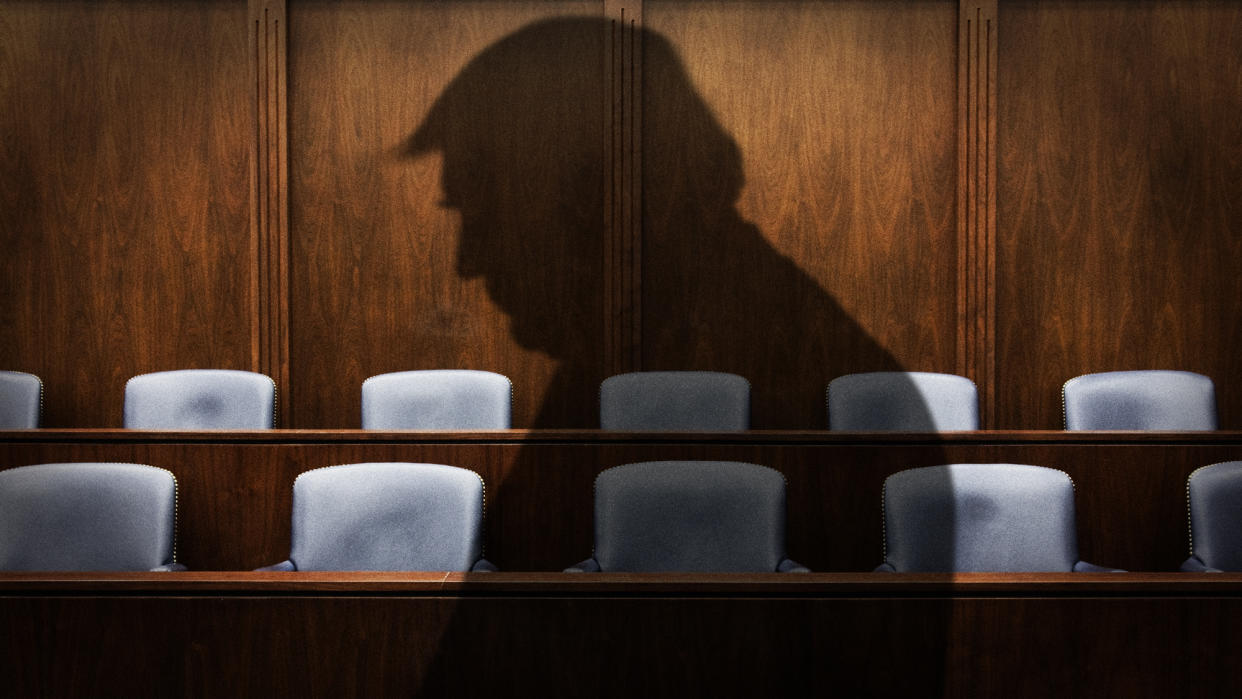Can Trump get a fair trial?

- Oops!Something went wrong.Please try again later.
- Oops!Something went wrong.Please try again later.
- Oops!Something went wrong.Please try again later.
Former President Donald Trump's first criminal trial got underway Monday with opening arguments and the first witness testimony in a Manhattan courtroom. Prosecutors said that shortly before the 2016 election Trump ordered "hush money" payments to a porn star who claimed she had an affair with him years earlier, then tried to cover up the payments by falsifying business records. As he arrived at the trial, which Politico described as "indisputably historic," Trump said the case was "election interference" intended to derail his 2024 bid to win back the White House from President Joe Biden.
Jury selection got off to a bumpy start last week, as dozens in the first batch of 96 potential jurors were weeded out after saying they couldn't be fair to the twice-impeached former president. One seated juror was replaced over old anti-Trump social media posts. Judge Juan Merchan admonished Trump for making audible comments about a prospective juror, warning that he would not have "jurors intimidated in this courtroom." By the end of the week, though, Merchan declared, "We have our jury," and swore in 12 jurors and six alternates who vowed to be "fair and impartial."
Trump has pleaded not guilty in what The New York Times noted was the "first criminal trial of an American president." He has repeatedly denied having sex with the adult-film actress, Stormy Daniels. He is accused of telling his former lawyer, Michael Cohen, to pay Daniels $130,000 to keep quiet so the scandal wouldn't damage his 2016 presidential campaign. Once in office, prosecutors say, Trump reimbursed Cohen in 12 installments but covered up the scheme by describing the checks to his then-lawyer as payments for ongoing legal services. Trump has repeatedly blasted District Attorney Alvin Bragg's case as a political "witch hunt." He also has accused Merchan of bias, and complained he can't get a fair trial in heavily Democratic New York City, arguing that any jury picked there would be biased against him. Will Trump's trial be fair?
Jurors set aside their prejudices all the time
Trump doesn't want an impartial jury but one "biased in his favor," said Julie Blackman in The New York Times. But he'll get the next best thing — 12 people determined to do their civic duty and decide the case based on the facts. "Well-instructed juries have shown time and again that they can put aside what they have learned outside the courtroom and focus on the evidence." Trump may be "as high-profile and polarizing as a defendant can be," but the jury can look past that.
It's wishful thinking to expect Trump to "get a trial most people will accept as fair," said Henry Olsen in The Telegraph. Manhattan is "one of the most Democratic and liberal counties in the country," so the jury pool was polluted. Bragg has made "repeated statements" making it clear he was out to get Trump any way he could. And Merchan refused to recuse himself even though he "donated to Biden's 2020 campaign and his daughter is a Democratic political consultant." No wonder "Trump supporters view this prosecution as grounded in politics, not law."
Trump isn't like other defendants
The fact the district attorney is prosecuting the case at all is unfair, said The Wall Street Journal editorial board. The charges Bragg filed against Trump were "dubious," at best. They hinge on the $130,000 Cohen paid Daniels to "keep quiet." Prosecutors accuse Trump of falsifying business records by saying the payments to reimburse Cohen were for legal work, not "hush money." But that's only illegal if it was done to conceal a crime. Bragg's argument that the payment to Daniels amounted to illegal campaign help is a "stretch."
Trump isn't getting railroaded; he's getting "preferential treatment," said James Romoser in Politico. Merchan recently imposed a gag order, but Trump still will "stand in the hallway outside the courtroom and denounce the charges," and "mutter 'witch hunt' within earshot of jurors." The "tolerance of his tirades is perhaps the most glaring sign of the judicial system's Trump exceptionalism. But it's far from the only example." Judges in Trump's criminal and civil cases have consistently given the former president and current Republican presidential candidate "more freedom and more privileges than virtually any other defendant in his shoes." That's unfair, but not to Trump.

